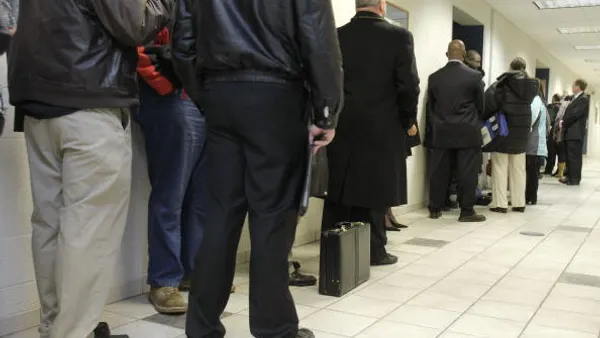Dive Brief:
- Consumer sentiment fell this month to the lowest level since June 2022 as the government shutdown intensified anxiety about inflation, the labor market and the economic outlook, the University of Michigan said Friday.
- A 17% plunge in consumers’ views of their personal finances and 11% decline in year-ahead expectations for business conditions pushed down a gauge of the mood among U.S. households, the university said, reporting the results of a November survey.
- “With the federal government shutdown dragging on for over a month, consumers are now expressing worries about potential negative consequences for the economy,” Joanne Hsu, director of the university’s consumer surveys, said in a statement.
Dive Insight:
A consumer survey released Friday by the Federal Reserve Bank of New York signaled anxieties similar to findings by the University of Michigan. For the third consecutive month, consumers’ expectations of losing their job within the next year rose to 43% in October, the highest level since April.
Also, the perceived probability of finding employment after job loss fell by 0.6 percentage point to 46.8%, remaining well below its 12-month trailing average of 50.6%, the New York Fed said.
Flagging a cooling labor market, the Fed on Oct. 29 trimmed the main interest rate by a quarter point to a range between 3.75% and 4% in its second rate reduction this year.
While affirming “a strong, solid vote” behind the decision, Fed Chair Jerome Powell noted “strongly differing views” among policymakers over whether to trim borrowing costs again during the central bank’s final meeting scheduled for Dec. 10.
Traders in interest rate futures see 66.4% odds that the central bank next month will trim the federal funds rate by a quarter percentage point compared with 63% odds on Oct. 31, according to the CME FedWatch Tool.
Since the Fed decision, central bankers have emphasized that a rate cut is not necessarily in the cards.
“With respect to the path of the policy rate going forward, I will continue to determine policy based on the incoming data, the evolving outlook and the balance of risks,” Fed Vice Chair Philip Jefferson said Friday, noting that “the economy has been growing at a moderate pace.”
The economy last quarter likely grew at a 4% annual rate, according to an Atlanta Fed estimate released Thursday.
Still, Jefferson noted in a speech that “labor market conditions appear to be consistent with a gradual cooling,” adding that “downside risks to employment have increased.”
Inflation has likely persisted above the central bank’s 2% target partly because of import taxes imposed since April, he said. “Market-based long-term inflation expectations continue to be well anchored.”
Among consumers, expectations for inflation in a year from now rose to 4.7% this month from 4.6% in October, Hsu said.
The decline in consumer sentiment this month spanned all population categories, including age, income and political affiliation, she said.















